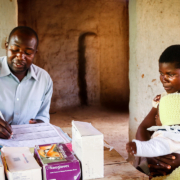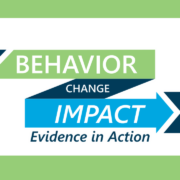Same Information, Different Order: Testing Before Consultation to Improve Protocol Adherence
Written by: Sriram Sridharan, Faraz Haqqi, Angela Acosta, Temitope Ogunbi, and Eno Idiong, Breakthrough ACTION
When treating suspected malaria cases, providers at many Nigerian health facilities often base treatments on their own clinical diagnosis, regardless of test results. The national guidelines, however, state that every case of fever must undergo parasitological testing for malaria and that no prescription of anti-malarial medication may be issued without a positive test result. Failure to comply with testing and treatment protocol leads to wasted resources in the form of unnecessary prescriptions for malaria medication. It also means that providers may be failing to detect and treat other serious illnesses, such as pneumonia, which can often present symptoms similar to malaria. Breakthrough ACTION addressed this issue in our fever case management project in Nigeria.
To understand the providers’ pattern of behavior, Breakthrough ACTION conducted a formative assessment through the lens of behavioral economics. We found that when providers deviate from the guidelines, it’s not primarily due to an informational gap about the guidelines themselves, but rather to the context in which providers work and make decisions. Providers are commonly overwhelmed with the volume of clients and perceive a trade-off between attending to all their clients and testing all of the fever cases. Providers also face a number of logistical hassles associated with sending clients for testing and seeing them again when they return with their test results. On top of all of this, the prevalence of malaria in the region is also extremely salient to providers, leading them not only to diagnose malaria without testing but often to disregard negative test results when the results contradict their initial assessments.
This understanding of the contextual cues that contribute to sub-optimal case management informed solutions that address the root of the problem. Insights about ‘defaults’ from the behavioral economics discipline demonstrate how changing the sequence (or the “default state”) of events can lead to desired behaviors. As part of a recent pilot program, Breakthrough ACTION implemented one of these solutions: ‘Testing Before Consultation,” a process change that requires clients with fevers (or a history of fever) to be tested for malaria before seeing the prescribing healthcare provider. Under the new default, every client with fever enters the consultation room with malaria test results in hand. Providers no longer need to decide whether or not to send clients for testing and can spend more of their time exploring other possible diagnoses for clients who test negative for malaria, improving client care, and reducing the incidence of prescription without testing. Moreover, this new process taps into people’s tendency to ‘anchor’, or rely heavily on the first piece of information they see that relates to a decision they’re making. With the redesigned process, this first piece of information is a malaria test result.
This simple redesign does not ask providers to consciously change how they usually do their work or to add entirely new tasks to their job. For zero additional cost, this process change avoids placing an additional burden on already overstretched providers while providing them with the information they need to make better clinical decisions right away. This was reflected in a feasibility test where the ‘Testing Before Consultation’ solution was received very positively by providers and facility staff. In combination with other designs, it also achieved positive trends in improving adherence to guidelines. The effectiveness of this approach has also been demonstrated in a recently published study, which found that a similar process change led to significant improvements in provider adherence to malaria testing guidelines in Ghana.
Interested in learning more? Read about our formative assessment process and solutions in this brief.

 Breakthrough ACTION
Breakthrough ACTION

 WHO
WHO Photo credit: amy Rakotoniaina/PMI/Flickr
Photo credit: amy Rakotoniaina/PMI/Flickr Pitshou Budiongo
Pitshou Budiongo
